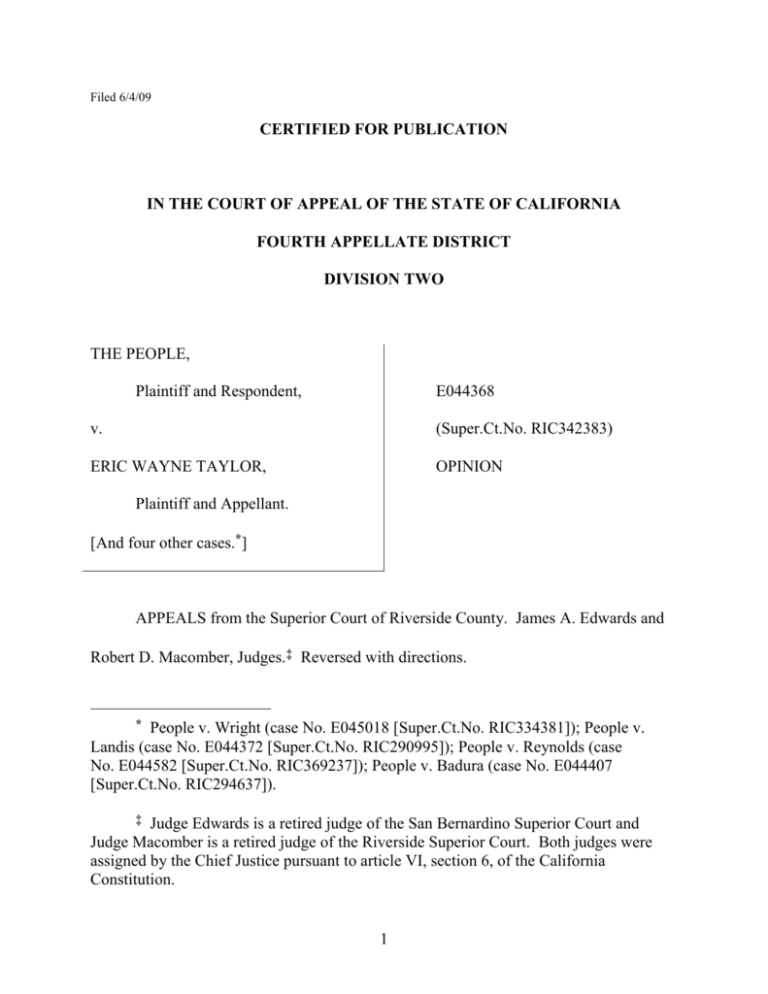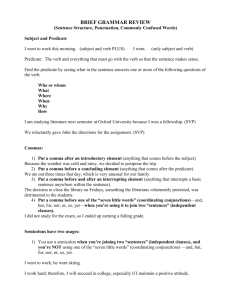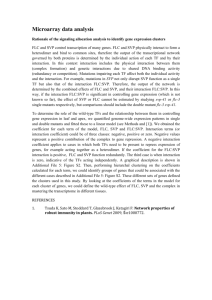Filed 6/4/09 CERTIFIED FOR PUBLICATION IN THE COURT OF
advertisement

Filed 6/4/09 CERTIFIED FOR PUBLICATION IN THE COURT OF APPEAL OF THE STATE OF CALIFORNIA FOURTH APPELLATE DISTRICT DIVISION TWO THE PEOPLE, Plaintiff and Respondent, E044368 v. (Super.Ct.No. RIC342383) ERIC WAYNE TAYLOR, OPINION Plaintiff and Appellant. [And four other cases.*] APPEALS from the Superior Court of Riverside County. James A. Edwards and Robert D. Macomber, Judges.‡ Reversed with directions. * People v. Wright (case No. E045018 [Super.Ct.No. RIC334381]); People v. Landis (case No. E044372 [Super.Ct.No. RIC290995]); People v. Reynolds (case No. E044582 [Super.Ct.No. RIC369237]); People v. Badura (case No. E044407 [Super.Ct.No. RIC294637]). ‡ Judge Edwards is a retired judge of the San Bernardino Superior Court and Judge Macomber is a retired judge of the Riverside Superior Court. Both judges were assigned by the Chief Justice pursuant to article VI, section 6, of the California Constitution. 1 Chris Truax, under appointment by the Court of Appeal, for Defendants and Appellants Eric Wayne Taylor, George Wright, and Robert Landis. Rudy Kraft, under appointment by the Court of Appeal, and Linda Acaldo for Defendant and Appellant Steven Arthur Reynolds. Linda Acaldo, under appointment by the Court of Appeal, for Defendant and Appellant Michael Badura. Rod Pacheco, District Attorney, and Elise J. Farrell, Deputy District Attorney, for Plaintiff and Respondent. INTRODUCTION1 Eric Wayne Taylor (Taylor), Robert Landis (Landis), Michael Badura (Badura), Steven Arthur Reynolds (Reynolds), and George Wright (Wright), collectively referred to as defendants, were convicted in separate criminal proceedings of various sexual offenses and were sentenced to state prison. Each was subsequently found to be a sexually violent predator (SVP) at the conclusion of his determinate sentence, and was subjected to civil 1 In case No. E044407, on August 25, 2008, this court issued an order reserving ruling on respondent’s request filed July 30, 2008, for this court to take judicial notice of the register of actions in the Superior Court of Riverside County case No. RIC294637. We hereby grant respondent’s request. In case No. E045018, on August 25, 2008, this court issued an order reserving ruling on respondent’s request filed August 4, 2008, for this court to take judicial notice of the register of actions in the Superior Court of Riverside County case No. RIC462460 and case No. RIC294637. We hereby grant respondent’s request. 2 commitments pursuant to the Sexually Violent Predator Act (SVPA; Welf. & Inst. Code, § 6600 et seq.),2 prior to November 2006. Under the law as it existed at the time of defendants’ initial commitments, the civil commitment was for a two-year period, after which the People were required to petition to extend the commitment (or to recommit) for an additional two years, if, in the opinion of the California Department of Mental Health (DMH), the individual still met the criteria for a SVP. On September 20, 2006, Senate Bill No. 1128 (2005-2006 Reg. Sess.) went into effect, changing the commitment term from two years to an indeterminate term. On November 7, 2006, Proposition 83, also known as Jessica’s Law, became law, further amending the provisions of the SVPA. Each defendant in this case was the subject of petitions to extend their two-year commitments when the amendments went into effect. In each case, the People made a motion to retroactively convert their first SVP commitment to an indeterminate term, which was granted by the trial court in each case. Thus, there were no trials on the current extension petitions. This consolidated appeal raises various challenges to the constitutionality of the statutory changes and the propriety of their retroactive application to individuals whose initial commitments predated the amendments. On this record, we conclude that imposing an indeterminate term under the SVPA amendments does not violate due process, equal protection, or ex post facto principles when a defendant is afforded a trial 2 All further statutory references are to the Welfare and Institutions Code, unless otherwise stated. 3 to determine if he or she currently meets SVP criteria. Because there were no trials on the current petitions, we must reverse with directions to complete the SVP recommitment proceedings in accordance with our opinion. We also hold that defendant Reynolds’s argument that his initial commitment was void due to the court’s reliance on a psychological assessment protocol that was not formally adopted (underground regulation) is not well founded. BACKGROUND A detailed history of the cases against each defendant is unnecessary to our decision, which involves pure questions of law. It is sufficient to note that all five defendants were previously convicted of offenses listed as violent sexual offenses within the meaning of the SVPA. Each defendant was sentenced to state prison for a determinate term, and each was referred for evaluation under the SVPA prior to release. All defendants were previously found to be SVP’s and committed to the DMH for twoyear terms under the SVPA. Petitions to extend those commitments were pending in each case in 2006, prior to the enactment of the SVPA amendments. In October 2007, after the effective date of the amendments and while the current SVP extension proceedings were pending, the trial court granted the People’s motions to retroactively apply the indeterminate terms to the initial commitments of Taylor, Badura, Landis, and Reynolds. A similar motion was made as to Wright, which was granted in January 2008. In granting the People’s motions to retroactively apply the indeterminate terms to the initial commitments, the trial court denied defendants’ requests for jury trials on the current SVP petitions. Each defendant appeals, asserting that the amendments (1) violate 4 due process guarantees based on the burden shifting provisions of section 6608; (2) violate the equal protection principle because SVP’s are treated differently from other persons civilly committed for mental illness; and (3) violate double jeopardy and ex post facto principles. Additionally, defendants claim that the order granting the People’s motion to retroactively convert their initial commitments to indeterminate terms violated their due process rights by denying each of them a trial on the current SVP petition. Reynolds also challenges his initial commitment as void due to reliance on assessment protocols that had not been formally adopted (underground regulations). We hold that the statutory scheme on its face is constitutional. However, Taylor, Badura, Wright and Reynolds were denied a trial on their current status as SVP’s, requiring reversal of the retroactive conversion of their initial commitments and remand for further proceedings to determine their status as SVP’s. We also hold that Reynolds’s initial commitment was not void, despite the fact the psychological assessment protocol had not been formally adopted. DISCUSSION We deal first with the issues common to all defendants. 1. Application of the Amended Provisions of the SVPA to Persons Subject to Petitions to Extend a Two-year Term Do Not Violate Due Process Principles Provided the Individuals Are Afforded a Trial to Determine Current SVP Criteria All five defendants argue that the amended provisions of the SVPA are unconstitutional because (a) each defendant was deprived of a trial; (b) the amended SVP 5 procedure places the burden on each defendant to petition for release after an indeterminate commitment; and (c) replacing a two-year commitment with an indeterminate commitment permits the state to hold a person for the rest of his or her life without having to prove he or she remains mentally ill and dangerous. Defendants also complain that the amended provisions of the SVPA violate the due process principle by shifting to each defendant the burden of proving they are no longer SVP’s. We disagree. Prior to the 2006 amendments, the SVPA required the People to file a new petition to extend the civil commitment of a SVP every two years and to prove that an individual met the criteria to be considered a SVP beyond a reasonable doubt. (Former §§ 6601, subd. (i), 6604, 6604.1; People v. Munoz (2005) 129 Cal.App.4th 421, 429.) In 2006, the Legislature amended the SVPA to provide for indeterminate terms of commitment, and the voters approved Proposition 83, which also provided for indeterminate terms of commitment for SVP’s. The amendments included indeterminate terms of commitment upon the initial order of commitment and deleted all references to two-year commitment terms or extensions of prior commitments. (§ 6604.1.) Prior to filing a petition to determine if an individual is a SVP, the individual must be evaluated by two practicing psychologists or psychiatrists. (§ 6601, subd. (d).) Once the petition is filed, the court conducts a probable cause hearing; if the court finds there is probable cause to believe the individual is a SVP, the person named in the petition may be detained in a secure facility or state hospital until a trial is completed. (§ 6602.) The individual is entitled to a trial by jury, assistance of counsel, and the right to retain experts, as well as access to all relevant medical and psychological records. (§ 6603.) 6 The court or jury shall determine whether, beyond a reasonable doubt, the individual is a SVP; if so, the individual shall be committed for an indeterminate term to the DMH for treatment and confinement. (§ 6604; Bourquez v. Superior Court (2007) 156 Cal.App.4th 1275, 1281 (Bourquez).) The 2006 amendments eliminated the requirement for a new or subsequent petition every two years. Nonetheless, the amended provisions require procedures to monitor an individual’s status as a SVP and provide for conditional release or discharge if the person is no longer a SVP. Each year, the DMH must conduct an examination of the individual’s mental condition and issue a report. (§ 6605, subd. (a).) At the individual’s request, a mental status examination may be conducted by an independent expert. (Ibid.) The annual report by the DMH must “include consideration of whether the committed person currently meets the definition of a [SVP] and whether conditional release to a less restrictive alternative or an unconditional release is in the best interest of the person and conditions can be imposed that would adequately protect the community.” (Ibid.) If the DMH determines that the individual is no longer a SVP, it must authorize that person to file a petition for judicial review. (§ 6605, subd. (b).) If the court finds probable cause for release, the individual is entitled to a trial de novo on his or her current status as a SVP. (§ 6605, subds. (b), (c).) If the court finds the individual is no longer a SVP, he or she may be released. (§ 6605, subd. (e).) Additionally, if the DMH determines that the individual’s mental condition has changed so that it is not likely he or she will commit a predatory sexually violent act while under treatment and supervision in the community, the director of the DMH is required to forward a copy of the report to the 7 county attorney, the individual’s attorney of record, and the committing court. (§ 6607, subd. (a).) Thus, even without the concurrence of the DMH, the individual may file a petition for release. (§ 6608, subd. (a).) Defendants in the instant case claim the new procedures violate their due process rights. In evaluating a due process claim, we employ the well-established three-factor test set forth by the United States Supreme Court in Mathews v. Eldridge (1976) 424 U.S. 319, 335, and consider (1) the private interest at stake; (2) the risk of an erroneous deprivation of that interest through procedures used, as well as the probable value, if any, of additional or other procedural safeguards; and (3) the state’s interest, including the function involved, and the fiscal and administrative burdens that the additional or other procedural requirements would raise. (See People v. Allen (2008) 44 Cal.4th 843, 865.) This test applies to involuntary civil commitments. (People v. Litmon (2008) 162 Cal.App.4th 383, 396-397 (Litmon), citing Addington v. Texas (1979) 441 U.S. 418, 425.) The private interest at stake is the deprivation of the individual’s liberty, but that liberty interest is not absolute. (Kansas v. Hendricks (1997) 521 U.S. 346, 356.) The state may involuntarily commit an individual if it proves by at least clear and convincing evidence that the individual is dangerous to others due to a mental illness. (Id. at p. 358.) The risk involved is that an individual may be erroneously held in a continuing commitment even though he or she is no longer a mentally ill and dangerous SVP; however, the procedures built into the amended SVPA mitigate that risk by providing for annual mental health evaluations and procedures by which an individual may seek discharge. These procedures minimize the risk of an erroneous determination. 8 The state’s interest is the strong interest in protecting society from persons who are dangerous to others because of a mental disease, and the state is entitled to involuntarily commit such individuals. (Kansas v. Hendricks, supra, 521 U.S. at p. 363.) The state also has a legitimate interest in conserving scarce fiscal and administrative burdens and avoiding unnecessary relitigation of issues. (Mathews v. Eldridge, supra, 424 U.S. at p. 348; United States v. Wattleton (11th Cir. 2002) 296 F.3d 1184, 1200.) As stated in the Proposition 83 initiative measure (Voter Information Guide, Gen. Elec. (Nov. 7, 2006) text of Prop. 83, p. 127), sex offenders are the least likely to be cured and most likely to reoffend. We are unable to find statistics relating to the size of SVP extension commitment caseloads, the related costs of commitments, or the rate of successful treatment and release of SVP’s, but as of January 5, 2009, the number of inmates referred to the DMH to determine if they qualified under the criteria of the sex offender commitment program was found to be 24,396, and of those persons, 7,827 met the criteria. (See <http://www.dmh.ca.gov/services_and_programs/forensic_services/ sex_offender_commitment_program/docs/BoxScores/box_2009/BoxScore_09Jan.pdf> (as of June 4, 2009).) Of that number, petitions for commitment as SVP’s had been filed in 1,397 cases, and, by the time of the data collection, 616 persons had been committed following probable cause determinations, with 295 still awaiting trial. (Ibid.) Initiating recommitment (or extension) proceedings every two years for each person committed is a time consuming and burdensome process for both the trial courts and the individuals. The amendments to the SVPA provide for involuntary commitment upon a showing of dangerousness due to mental illness by proof beyond a reasonable doubt. 9 This standard is more demanding than the clear and convincing evidence standard required under federal due process principles. (Kansas v. Hendricks, supra, 521 U.S. at p. 358.) The statutory scheme further protects the civil rights of persons subject to commitment as SVP’s by insuring access to discovery, legal representation, trial by court or jury, and annual postcommitment evaluations. Thus, it provides a balance between the protection of society and guarding the individual’s liberty interests, as well as protecting the judicial system against unnecessary or frivolous jury trial actions where there is no competent evidence to suggest a change in the mental status of the committed person by providing for indeterminate commitments. (People v. Shields (2007) 155 Cal.App.4th 559, 564.) We therefore find that the statutory scheme, on its face, is constitutional. The fact that the amendments shift the burden to each defendant to show they are no longer suffering from a mental illness rendering them dangerous to the public does not invalidate the statutory scheme. Adequate safeguards, including annual evaluations, are built in to insure against indefinite detention of SVP’s who are no longer mentally ill or dangerous to others. (See Foucha v. Louisiana (1992) 504 U.S. 71, 83.) However, there are two problems with the application of the new law in the present group of cases. First, the precedents upon which the People relied in arguing that the legislative scheme is constitutional have been depublished pursuant to recent grants of 10 review.3 Second, in granting the People’s motions to retroactively convert each defendants’ initial commitment to indeterminate terms, the court denied them a hearing on the currently pending extension petitions. It did so based on the People’s argument that each defendant had been afforded trials in all prior initial commitment proceedings, as well as in their subsequent recommitment proceedings, thus satisfying the need for a court or jury determination that they met the criteria for SVP’s on multiple occasions. We cannot agree, based on the existing state of the law. In Bourquez, supra, 156 Cal.App.4th 1275, the reviewing court concluded that application of the amended provisions of the SVPA to a defendant currently facing recommitment proceedings did not constitute improper retroactive application of the law. The court noted that an extension hearing is a new and independent proceeding at which the petitioner must prove the person meets the criteria of a SVP. (Bourquez, at p. 1289.) It held that because a proceeding to extend commitment under the SVPA focuses on the person’s current mental state and dangerousness, application of the indeterminate term of commitment does not attach new legal consequences to conduct that was completed before the effective date of the law. (Bourquez, at p. 1289.) An extension proceeding requires a new determination of the individual’s status as a SVP, so the amendments may be applied prospectively to all pending and future 3 People v. Johnson (2008) 162 Cal.App.4th 1263, review granted August 13, 2008, S164388; People v. Riffey (2008) 163 Cal.App.4th 474, review granted August 20, 2008, S164711; People v. Boyle (2008) 164 Cal.App.4th 1266, review granted October 1, 2008, S166167; People v. Force (2009) 170 Cal.App.4th 797, review granted April 15, 2009, S170831; and People v. Castillo (2009) 170 Cal.App.4th 1156, review granted May 13, 2009, S171163. 11 commitment proceedings. (People v. Whaley (2008) 160 Cal.App.4th 779, 799 (Whaley).) The reference to an “initial” commitment in section 6604.1, subdivision (a), has been interpreted to reflect when the commitment term begins for a person first committed to an indeterminate term, rather than demonstrating an intent by the voters to retroactively apply an indeterminate term to those already committed. (Whaley, at p. 798.) Even under the preamended version of the SVPA, an extension hearing was a new and independent proceeding that required a new determination of SVP status (People v. Munoz (2005) 129 Cal.App.4th 421, 429-430), so application of the indeterminate term provisions to current recommitment proceedings does not constitute retroactive application of the amendment. (People v. Carroll (2007) 158 Cal.App.4th 503, 513.) However, it is a different matter to convert a previously expired limited term of commitment into an indeterminate term without affording the individual a trial on the question of whether he or she currently meets the SVP criteria. Although the People argue that the amended legislation clearly evinces an intent to apply the indeterminate term to the previously imposed and expired two-year commitment, we cannot agree with that analysis in light of Litmon, supra, 162 Cal.App.4th 383, and Whaley, supra, 160 Cal.App.4th 779. The statute is not a model of legislative drafting, lacking specific provisions to deal with persons currently serving two-year extended commitments on the date the amendments went into effect. On its face, it expressly applies to persons who are still incarcerated in state prison serving their 12 determinate sentences, who are referred for SVP proceedings and it expressly applies to the initial commitment. (See Whaley, at pp. 798-799.) However, an interpretation that the Legislature intended the amendments not to apply to persons previously found to be SVP’s, as asserted by each defendant in this matter, would lead to an absurd result: the release of persons still suffering from mental disorders rendering them dangerous to the public. This result is precisely what the amendments aimed to prevent. Our duty is to construe the statute so as to avoid absurd or anomalous results. (People v. Martinez (1995) 11 Cal.4th 434, 448.) The approach we take effectuates the purpose of the law, insuring that persons previously determined to be SVP’s will continue to be detained so long as they meet the criteria of SVP’s and no longer. It is more reasonable to interpret the legislative reference to initial commitment as referring to any post-November 8, 2006 commitment order following a determination of SVP status under section 6604. (Whaley, supra, 160 Cal.App.4th at pp. 798-799.) We must therefore conclude that retroactive application of the indeterminate term to the previously completed initial commitment was erroneous, and that the proper procedure is to impose the indeterminate term in conjunction with the initiation of proceedings to extend a SVP commitment. Thus, the amended provisions may lawfully be applied to persons previously committed under the former law who are the subjects of subsequent extension proceedings. (People v. Shields (2007) 155 Cal.App.4th 559, 563-564.) The proper procedure would have been to proceed to trial with the current SVP recommitment 13 proceeding and to impose the indeterminate term upon the current determinations that each defendant had satisfied the SVP criteria. (See Bourquez, supra, 156 Cal.App.4th at p. 1289.) Our conclusion finds support in Litmon, supra, 162 Cal.App.4th 383 and Whaley, supra, 160 Cal.App.4th 779, which are final and persuasive. We conclude that a court may impose an indeterminate commitment following a current SVP recommitment proceeding for persons originally committed under the old law. Here, the court retroactively converted prior completed two-year terms to indeterminate terms without a current finding that each defendant met the criteria of a SVP without a trial on the current petition. Remand is necessary to correct these errors. While we conclude the court erred, requiring reversal, we agree with the People that defendants should not be discharged or released. An individual is not automatically entitled to release upon the expiration of a term of commitment, even if a timely petition to extend the commitment is not filed. (§ 6601, subd. (a)(2); People v. Allen (2007) 42 Cal.4th 91, 105 [release of a Mentally Disordered Offender (MDO) not required despite the delay in filing recommitment petition].) In other words, unlawfulness of an individual’s custodial status (due to expiration of his or her determinate term or expiration of his or her prior commitment) does not divest the trial court of jurisdiction to proceed on a petition for commitment or recommitment. (People v. Superior Court (Small) (2008) 159 Cal.App.4th 301, 307.) Each defendant had been evaluated by two mental health experts prior to initiation of the current extension proceedings, and the evaluations concluded that they each met 14 the SVP criteria. (§ 6601.5.) Expert witnesses testified as to their conclusions that each of the individuals currently met the criteria of a SVP at a probable cause hearing, and the trial court found that there was probable cause to find that each defendant currently met the SVP criteria, justifying continued detention of the respective defendants. (§ 6602.) Therefore, the matter must be remanded for further proceedings related to the most recent petition to extend the commitments of each defendant, at the conclusion of which the court may impose indeterminate terms of commitment if they are found to currently meet the criteria for SVP’s beyond a reasonable doubt. Defendants are to remain detained until that time. 2. Remaining Claims (Equal Protection, Double Jeopardy, Ex Post Facto) Reynolds and Badura claim that the amended provisions of the SVPA violate the equal protection, double jeopardy, and ex post facto principles. Because we must reverse the commitments on other grounds, we do not need to address these claims in depth, particularly where the issues are pending in the California Supreme Court.4 However, we disagree with defendants’ premises respecting the statutory amendments as a whole. a. Equal Protection Defendants point out that other persons subject to civil commitment for mental illness, such as persons who are subject to involuntary treatment under the LantermanPetris-Short Act (LPS Act; § 5150 et seq.) or following a finding of not guilty by reason of insanity (NGI) are subject to determinate commitments, not indeterminate terms. 4 The lead case is People v. McKee (2008) 160 Cal.App.4th 1517, review granted July 9, 2008, S162823. 15 However, we note that the concept of equal protection of the laws is that persons similarly situated with respect to the legitimate purpose of the law receive like treatment. (In re Smith (2008) 42 Cal.4th 1251, 1263.) The first requirement of a meritorious claim, therefore, is a showing that the state has adopted a classification that affects two or more similarly situated groups in an unequal manner. (Cooley v. Superior Court (2002) 29 Cal.4th 228, 253.) If the persons are not similarly situated for purposes of the law, then the equal protection claim necessarily fails. (People v. Buffington (1999) 74 Cal.App.4th 1149, 1155.) A person may be subject to involuntary commitment for mental illness under various statutory provisions. Under the LPS Act, a person may be the subject of conservatorship proceedings and involuntarily committed if he or she is found to be a danger to himself or others, or gravely disabled, because of a mental disorder. (Welf. & Inst. Code, § 5350.) A commitment pursuant to the LPS Act is for one year, subject to extensions. (Welf. & Inst. Code, § 5361.) A person civilly committed after a finding of NGI (Pen. Code, § 1026) is subject to a maximum term of commitment of two years, subject to extensions. (Pen. Code, § 1026.5.) Under the MDO law, a prisoner may be subject to involuntary restraint beyond his or her parole eligibility date if the offender has a severe mental disorder and poses a danger to the public. (Pen. Code, § 2960 et seq.) The maximum period of commitment as a MDO is one year, subject to extensions. (Pen. Code, § 2962.) While SVP’s, MDO’s, and persons committed under the LPS Act all suffer from mental disorders, the dangers that those in each group pose have been held to be 16 different. (Cooley v. Superior Court, supra, 29 Cal.4th at p. 253 [SVP’s not similarly situated to the LPS Act]; People v. Buffington, supra, 74 Cal.App.4th at p. 1163 [SVP’s not similar to MDO’s]; People v. Hubbart (2001) 88 Cal.App.4th 1202, 1221-1222 [SVP’s not similarly situated to the LPS Act or MDO].) As to persons involuntarily committed after a finding of NGI, we observe that such persons have not suffered any criminal conviction, much less a conviction of a sexually violent offense, so they are not similarly situated. Because defendants have not established that they are similarly situated with persons involuntarily committed under NGI, the LPS Act, or MDO procedures, they have not established an equal protection violation. b. Double Jeopardy and Ex Post Facto Claims All five defendants argue that their indeterminate commitments violate double jeopardy and ex post facto principles. We disagree. The constitutional principles prohibiting double jeopardy and ex post facto laws apply only to criminal proceedings. (Kansas v. Hendricks, supra, 521 U.S. at p. 361.) However, the SVPA is civil in nature. It does not impose liability or punishment for criminal conduct; instead, a person found to be a SVP is committed to a state hospital for treatment of the mental disorder that prevents him or her from controlling his or her sexually violent criminal behavior. (Hubbart v. Superior Court (1999) 19 Cal.4th 1138, 1171.) The Legislature has specifically determined that persons found to be SVP’s “shall be treated, not as criminals, but as sick persons.” (§ 6250.) As a reviewing court, we 17 defer to the statement of the Legislature indicating that the SVPA is not penal in nature. (Hubbart, supra, at p. 1171.) It is true that some of the provisions of Proposition 83 involved increased criminal penalties and broadened the scope of the SVPA. However, it does not follow that all the changes in the SVPA are punitive. Despite the fact their civil commitments are for an indefinite time, the critical factor is whether the duration of their confinement is linked to the stated purposes of the commitment, namely, to hold the person until his mental abnormality no longer causes him to be a threat to others. (Kansas v. Hendricks, supra, 521 U.S. at p. 363.) The opportunities for conditional release and regular evaluations ensure that commitment is limited to the duration of a defendant’s dangerousness. It is noteworthy that even before the passage of Proposition 83 and Senate Bill No. 1128, a SVP’s commitment was potentially indefinite, since the SVPA permitted unlimited extensions of the initial commitment until such time as the DMH considered the individual to be sufficiently nondangerous that he or she could be released. The same is true under the current law, ensuring that the individual who is involuntarily committed under the SVPA is a mentally ill and dangerous SVP and that the individual will be released if he or she is no longer mentally ill. (Foucha v. Louisiana, supra, 504 U.S. at p. 83.) Because nothing in the amendments authorizes or condones the involuntary commitment of individuals who are no longer mentally ill and dangerous, the SVPA is not punitive in nature. Therefore, principles of former jeopardy and ex post facto do not 18 apply. (People v. Carlin (2007) 150 Cal.App.4th 322, 348, foll. Hubbart v. Superior Court, supra, 19 Cal.4th at p. 1171.) 3. Reynolds Has Forfeited Any Challenge That His Commitment Was Rendered Void by “Underground Regulations” Relating to Protocols to Be Followed by Evaluators In a supplemental opening brief, Reynolds argues his initial commitment was illegal because it derived from the DMH’s reliance on a mental health evaluation protocol that was subsequently invalidated by the Office of Administrative Law (OAL) as being an “underground regulation.” The term “underground regulation” refers to statutorily mandated protocols that have not been formally adopted. Protocols following mandatory guidelines are deemed regulations by the OAL, which may not be used by a state agency until they are formally adopted, following compliance with procedural requirements under the Administrative Procedure Act. Because the OAL determined that the protocol used by the DMH for SVP evaluations had not been formally adopted, it was deemed an “underground regulation.” (See Castillo, supra, 170 Cal.App.4th at pp. 1174-1175.) However, Reynolds failed to present this ground in the trial court during any commitment proceeding, so it has been forfeited. (People v. Medina (2009) 171 Cal.App.4th 805, 817-818 (Medina).) Although Reynolds asserts that the initial determination that he met the criteria for a SVP was void due to reliance upon an invalid protocol, he does not assert that the trial court lacked subject matter jurisdiction. As the reviewing court found in Medina, a claim that a trial court acted in excess of its jurisdiction, as opposed to lacking fundamental 19 jurisdiction to act, is subject to forfeiture by failing to preserve it in the trial court. (Medina, supra, 171 Cal.App.4th at pp. 817-818.) Reynolds’s initial commitment was not void. Even if the claim had not been forfeited, we would find no error on the merits. Each SVP extension proceeding is an independent determination that the person meets the criteria for a SVP based on his current mental status; it does not serve as a continuation of the initial commitment or as a review hearing. (Bourquez, supra, 156 Cal.App.4th at p. 1289; Whaley, supra, 160 Cal.App.4th at pp. 795-796.) A proceeding to extend a commitment under the SVPA focuses on the person’s current mental state based upon current mental evaluations. (Bourquez, supra, at p. 1289; see also, Castillo, supra, 170 Cal.App.4th at p. 1182.) Any errors in relying on “underground regulations” in the initial commitment have long since been superseded by later SVP evaluations. In the current proceedings, Reynolds was evaluated by two mental health professionals who conducted new evaluations and who testified at the probable cause hearing at which the court found he currently met the SVP criteria. Reynolds discusses in his supplemental brief how the “STATIC-99,” the instrument used in the SVP assessment process, is inadequate or unreliable relating to the actuarial approach to predicting recidivism.5 However, Reynolds does not appear to take issue with the diagnosis or 5 Reynolds also refers to the fact that the critiques of the evaluation process were not accepted by the jury, a claim that probably crept into his brief from a previous appeal since there was no jury trial in the current SVP proceeding. Indeed, counsel acknowledges in his opening brief that there was no evidentiary hearing in this case, although the court’s minutes reflect that a probable cause hearing was conducted at which [footnote continued on next page] 20 claim that the current evaluations do not support a conclusion that he meets the proper SVP criteria or that the evaluators would have drawn different conclusions using the proper assessment protocol. Thus, even if there were error in the use of the assessment protocol pursuant to the “underground regulations,” Reynolds cannot show he would have been screened out or otherwise found not to be a SVP. (Medina, supra, 171 Cal.App.4th at p. 820.) Any error relating to the use of the protocol in Reynolds’s original commitment proceedings has been negated by current evaluations showing that he suffers from a mental illness making him dangerous to the public, which he does not allege were tainted by the “underground regulations.” DISPOSITION The judgments are reversed with directions to conduct further proceedings relating to the petitions to extend their SVP commitments under the amended provisions of the SVPA. RAMIREZ P. J. We concur: McKINSTER J. RICHLI J. [footnote continued from previous page] [footnote continued from previous page] Drs. Goldberg and Corpi testified. We, therefore, disregard the discussion of the criticisms of the “STATIC-99” in Reynolds’s supplemental opening brief. 21








